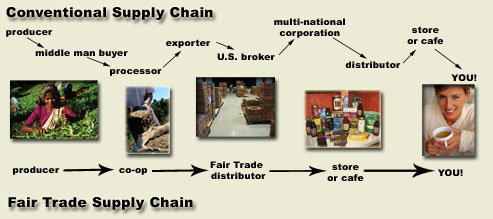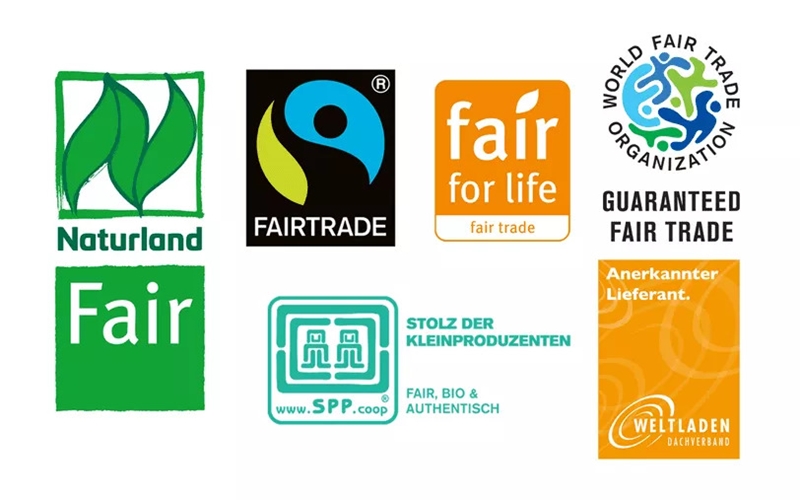Fair Trade is a global movement for fair and ethical trade that pays producers a fair price for their labor and provides better products for consumers.
―
Q. What is Fair Trade?
―
A. Fair Trade is a global movement that advocates for fair and ethical trade that pays producers a fair price for their labor and provides consumers with better quality products.
Since the industrialization era, most countries in the northern hemisphere of the globe have made great economic progress through trade, but many countries in the southern hemisphere, including Africa, are still struggling to escape from severe poverty.
The idea of Fair Trade emerged to address issues such as wealth skewing, labor exploitation, and human rights violations that result from the "unfair trade structure" between these economically developed and less developed countries.
The main cause of poverty in the Global South is due to 'unequal trade structures,' and the Fair Trade movement aims to correct these trade structures and give marginalized producers the opportunity to participate in the market, and to help producers make a sustainable living by offering fair terms of trade and fair prices.
Fair Trade coffee is a prime example. While conventional coffee has a worker profit of 0.5% (as a percentage of sales), Fair Trade coffee has a worker profit of about 6%, which means that producers earn about 10 times more than conventional coffee.
In addition to coffee, there are fair trade foods such as cocoa, olive oil, sugar, chocolate, bananas, tea, wine, pepper, and dried apricots, and a variety of products such as clothing, handicrafts, and bags are sold in fair trade.
●Fair Trade vs. Fairtrade
The terms Fair Trade and fairly traded refer to the international effort to fight global poverty by supporting direct, equitable, and sustainable trade between producers in the Southern Hemisphere and consumers in the Northern Hemisphere.
Meanwhile, Fairtrade is a proper noun that refers to food products and other goods that are produced in accordance with a wide range of economic, environmental, and social standards set by the Fairtrade International system.
Source: Fairtrade International
―
Q. How does Fair Trade differ from conventional trade?
―
To put it simply, Fair Trade is similar to direct trade. Let’s take a look at the table below.

Source: Green America
Conventional trade goes through a complex process: producer→ middleman buyer→ processor→ exporter→ broker→ multinational corporation→ distributor→ store→ consumers. Along the way, commodity prices are constantly inflated as middlemen profit.
In the Fair Trade model, on the other hand, the process is simple: producer → cooperative → Fair Trade supplier → store → consumers.
Suppliers buy what they can directly from cooperatives, cutting out unnecessary middlemen and helping farmers develop the business skills they need to be more competitive.
―
Q. What are the benefits of Fair Trade?
―
Fair Trade supports small-scale producers in developing countries through a more transparent and fairer form of trade.
It provides these disadvantaged producers with a minimum price that ensures their continued production and supports sustainable development in the region. Fair Trade Finder, a US-based fair trade advocacy organization, summarizes the social value of fair trade as follows.
▪ Price control
The Fair Trade system acts to stabilize pricing so that workers can focus on developing products and services over the long term. This is similar to subsidizing farmers in developed countries. Price controls attempt to cover the average cost of developing crops sustainably, which is especially important when market prices drop significantly.
▪ Living wages for workers
In general, workers within the Fair Trade system are paid very low wages for their hard work. They are often exploited because they live in countries without strong labor laws. To remedy this, the Fair Trade system pays producers a "Fairtrade Premium" in addition to the "Base Selling Price.”
This premium provides workers with essentials, services, businesses and community projects, including job training, education, housing and health care for workers and their children.
▪ Safe and fair working conditions
The Fair Trade system prohibits discrimination, sexual assault, unsafe factory and farm conditions, forced labor, and child labor.
▪ Long-term planning
Workers are safer and have stronger ties to buyers through the Fair Trade system, allowing them to be more prepared for the future.
▪ Organic products
Although this is not a requirement, Fair Trade products are generally more environmentally friendly. Farmers are encouraged to switch to organic farming and not use genetically modified organisms (GMOs). And they learn how to keep their soil healthy and how to manage waste responsibly.
―
The 10 Principles of Fair Trade
―
Price tag on a soccer ball is somewhere around 100 US dollars.
But only 1 dollar of that goes to the worker making the soccer ball in Pakistan. This is not fair, and it needs to change.
The World Fair Trade Organization(WFTO) has developed the Ten Principles of Fair Trade to help improve unfair practices like the soccer ball example and put people and planet first.
Whether you're trying to be Fair Trade compliant as a producer or evaluating companies as a consumer, these principles can help guide you.

Source: World Fair Trade Organization
1. Create opportunities for economically marginalized producers
Our organization works primarily with economically disadvantaged producers and workers to help them escape income insecurity and poverty. Furthermore, we help them become socially and economically empowered.
2. Transparency and accountability
Our organization builds solidarity by being transparent with stakeholders and includes producers and workers in the communication process.
3. Fair Trading Practices
Our organization maintains relationships of trust by trading with marginalized producers in ways that take into account both their social and economic circumstances, rather than solely pursuing profit.
4. Fair Payment
We engage in dialog with producers to ensure that a fair price is paid, taking into account unstable market conditions and local living wages.
Fair prices: Fair prices are freely negotiated through dialog between buyers and sellers and are based on transparent price setting, which includes fair wages and fair profits.
Fair wage: A fair wage is a freely negotiated and mutually agreed upon wage that is equitable and, at a minimum, pays a local living wage.
Local living wage: A local living wage is the remuneration a worker receives for a standard work week (48 hours or less) in a particular location, which should be sufficient to provide a decent standard of living for the worker and their family.
5. No child labor and forced labor
Our organization complies with the United Nations Convention on the Rights of the Child and national and local laws on the employment of children. We do not subject our employees, members, or teleworkers to forced labor.
6. Commitment to non-discrimination, gender equity, women's economic empowerment, and freedom of association.
Our organization does not discriminate on any grounds (race, caste, nationality, religion, disability, gender, sexual orientation, union membership, political affiliation, age, etc.) with respect to employment, wages, promotions, education and training, and retirement.
7. Ensuring good working conditions
Our organization provides a safe and healthy working environment for its employees or members. At a minimum, we comply with national and local laws and International Labor Organization (ILO) conventions on health and safety.
8. Providing Capacity Building
Our organization aims to have a positive development impact on marginalized small-scale producers through Fairtrade. We use the Fair Trade Premium to help build producer capacity by building schools or improving working conditions.
9. Promoting Fair Trade
Our organization raises awareness of problems in the international trade market and educates people about the transparency of Fairtrade. The Fair Trade company provides customers with information about the organization, the products it sells, and the producers. And they always use honest advertising and marketing techniques.
10. Protection of the environment
Our organization supports and implements production, agricultural, service, and trade activities that conserve natural resources, have a low carbon footprint, are culturally sensitive, socially just, and economically viable.
―
How consumers can support Fair Trade
―
Identifying a real Fair Trade product may not be as easy as it sounds, as many companies are greenwashing to pretend to be sustainable. Here are some tips on how to spot a legitimate Fair Trade product.
● Look for a Fair Trade logo
It's nearly impossible to research every product you buy to make sure it was produced and sold fairly. Instead, look for the certification labels of the world's largest Fair Trade organizations!
Fairtrade, Fairtrade Certified, World Fair Trade Organization, and the Fair Trade Federation all support iconic certification labels that tell consumers that a product meets international standards that protect producers and the planet.

Sourc: Forum Fairer Handel
● Shop at eco-friendly stores
The easiest way to find Fair Trade items, whether certified or not, is through stores that sell climate-friendly clothing and gifts.
If you don't have a Fair Trade store like Ten Thousand Villages in your town, you can also try smaller shops or online stores that cater to ethically-minded consumers.
● Buy local
The purpose of Fair Trade is to connect growers with consumers. Even without official certification, buying produce from a local farmers market or CSA (consumer supported agriculture) program is effectively Fair Trade.
For one thing, local produce is often cheaper, and for another, it reduces your carbon footprint by cutting out the middleman, so you're helping to keep the planet healthy.
“Only sincere love and continuous sacrifice is capable of creating a world of peace.
We must be willing to offer everything.”
-Dr. Sun Myung Moon
Co-founder of the Sunhak Peace Prize-
Learn more: Sustainable Consumption and Production to Save the Planet As the World Gets Smaller, We Need to Become Global Citizens |
Written by Sharon Choi
Director of Planning
Sunhak Peace Prize Secretariat
Translated by Hyang Oh

